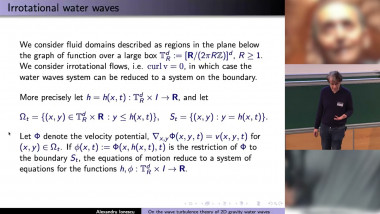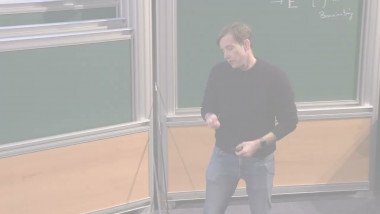
On the Wave Turbulence Theory of 2D Gravity Water Waves
By Alexandru Ionescu

Anomalous Diffusivity and Regularity for Random Incompressible Flows
By Scott Armstrong
Appears in collection : Physique mathématique des nombres de Hurwitz pour débutants
The "topological recursion" defines a double family of "invariants" $W_{g,n}$ associated to a "spectral curve" (which we shall define). The invariants $W_{g,n}$ are meromorphic $n$-forms defined by a universal recursion relation on $|\chi|=2g-2+n$, the initial terms $W_{0,1}$ and $W_{0,2}$ being the canonical 1-form and 2-form on the spectral curve. Those invariants have fascinating mathematical properties, they are "symplectic invariants" (invariants under some symplectic transformations of the spectral curve), they are almost modular forms, they satisfy Hirota-like equations, they satisfy some form-cycle duality deformation relations (generalization of Seiberg-Witten), they are stable under many singular limits, and enjoy many other fascinating properties... Moreover, specializations of those invariants recover many known invariants, including Hurwitz numbers to which this conference is dedicated (see M. Kazarian' lecture), intersection numbers, Gromov-Witten invariants, numbers of maps (Tutte's enumeration of maps), or asymptotics of random matrices expectation values. And since very recently, it is conjectured that they also include knot polynomials (Jones, HOMFLY, super polynomials...), which provides an extension of the volume conjecture. We shall present a few examples and mention how these invariants were first discovered in random matrix theory, and then observed or conjectured in many other areas of maths and physics.
